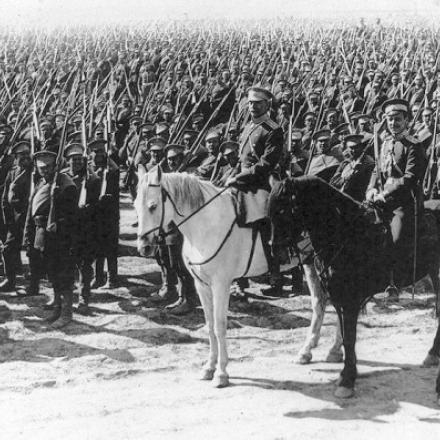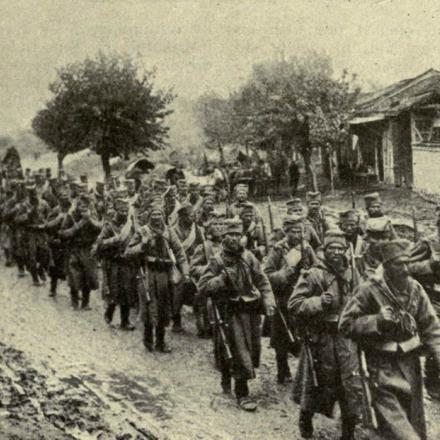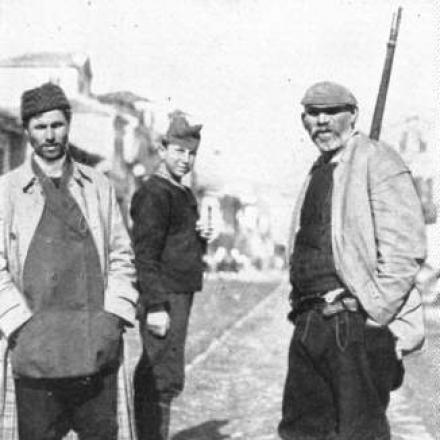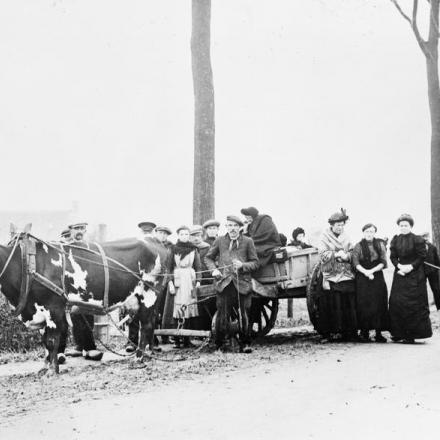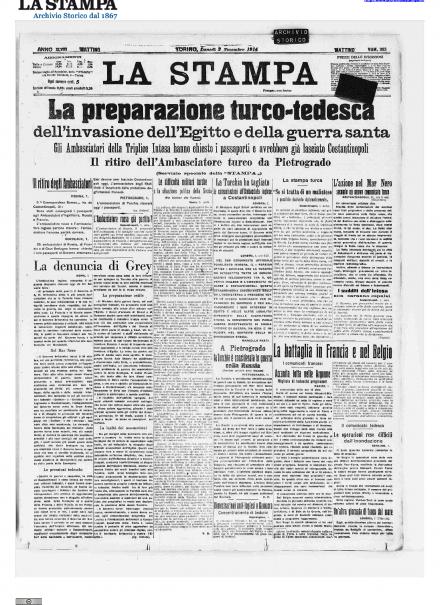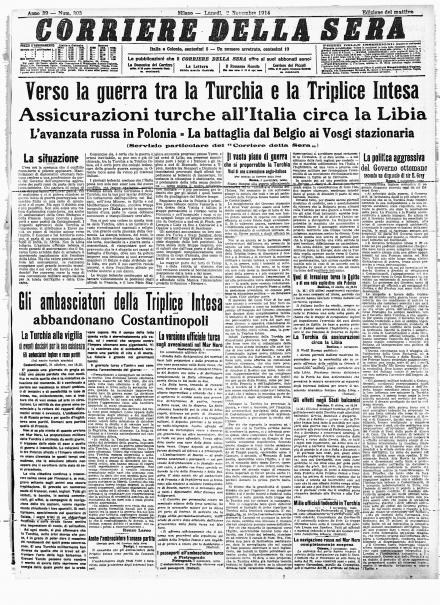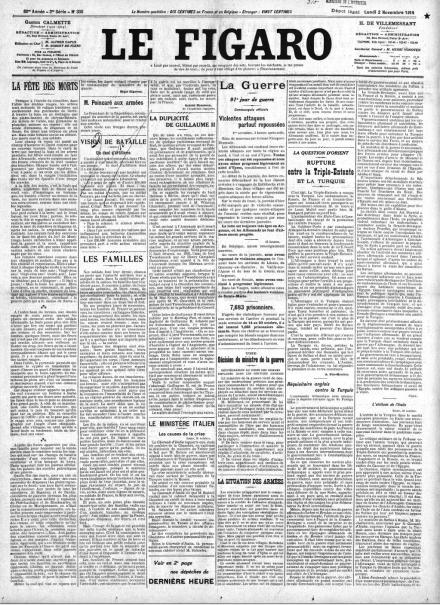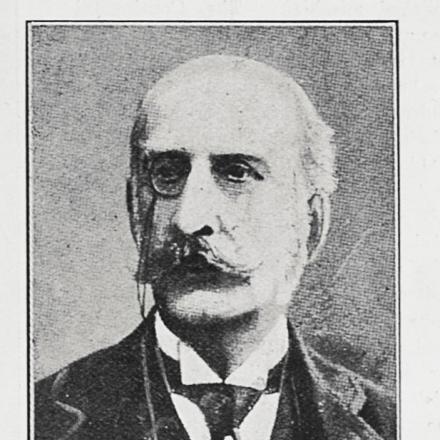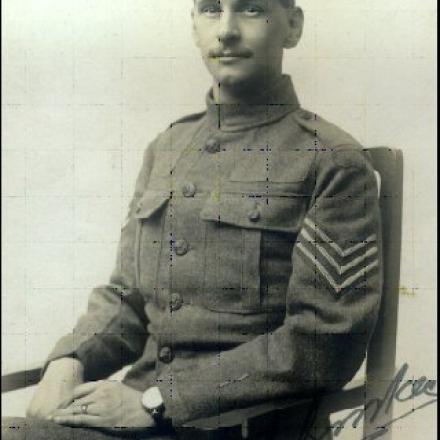Pietrogrado-Costantinopoli: è guerra
L’ultimatum è scaduto: il 2 novembre la Russia dichiara guerra all’Impero ottomano. Il Governo turco si porta avanti con il lavoro e in un comunicato annuncia lo “stato di guerra” con tutte le potenze della Triplice Intesa. Gli Ambasciatori inglese e francese lasciano Costantinopoli.
È la Russia a muoversi per prima sul nuovo fonte: l’offensiva di Berchman, nella regione caucasica, rappresenta il primo ingaggio militare tra l’esercito zarista e quello ottomano.
Non è l’unica operazione portata avanti da Pietrogrado: a nord inizia la nuova invasione della Prussia orientale; in Galizia si conclude la battaglia di Khyriv.
Sul fronte occidentale i tedeschi si ritirano da quasi tutta la sponda ovest dell’Yser; le forze vanno concentrate per l’attacco a Ypres. Le battaglie di Messines, Armentières e La Bassée si esauriscono.
In Francia le linee britanniche vengono perforate a Neuve-Chapelle, riconquistata dall’esercito del Kaiser.
A Londra non apprezzano: si vuole strangolare economicamente il nemico; il blocco navale sulla Germania viene dunque stretto e rafforzato. Tutto il Mare del Nord viene dichiarato “zona militare” a partire dal 5 novembre. La Royal Navy minerà ampie porzioni di mare e annuncia ispezioni su tutte le imbarcazioni battenti bandiera neutrale.
In Africa i britannici cercano di infliggere un altro duro colpo alle colonie tedesche: con lo sbarco di Tanga si punta all’invasione dell’odierna Tanzania.
Davide Sartori
GLI AVVENIMENTI
Politica e società
- La Russia dichiara guerra all'Impero ottomano. Gli ambasciatori russi e francesi lasciano Costantinopoli.
- Un comunicato del Governo turco annuncia lo "stato di guerra" tra Turchia e Intesa.
- La Serbia interrompe le relazioni con l'Impero ottomano.
- La Gran Bretagna pubblica le provocazioni turche.
- Il Governo indiano annuncia l’immunità dei luoghi sacri musulmani durante le ostilità con la Turchia.
- Tutto il Mare del Nord è proclamato zona militare dall’Ammiragliato inglese a partire dal 5 novembre.
- Il Regno Unito inasprisce il blocco navale sulla Germania.
- Il Re d'Italia incarica nuovamente l’on. Salandra della formazione del Governo.
- La prima unità “F” della Expeditionary Force indiana lascia l’India per l’Egitto.
Fronte occidentale
- Finisce la battaglia di La Bassée, con una situazione di impasse.
- Finiscono le battaglie di Messines e Armentières, ennesimo stallo tra Alleati e tedeschi.
- Le linee inglesi vengono bucate a Neuve-Chapelle, rioccupata quindi dai tedeschi.
- I tedeschi si ritirano da quasi tutta la sponda occidentale dell’Yser, concentrandosi per l’attacco su Ypres.
Fronte orientale
- La Prussia orientale invasa di nuovo dalle forze russe.
- Finisce la battaglia di Chyrow (Khyriv).
Fronte meridionale
- A Valona sbarcano 1.200 gheghi, soldati di Essad Pascià, col pretesto di dare esecuzione al bando sulla leva militare.
- Aeroplani austro-ungarici bombardano il porto di Antivari, distruggendo gli uffici della Compagnia italiana.
Fronte asiatico ed egiziano
- Offensiva di Berchman, primo ingaggio militare nel Caucaso durante la Prima guerra mondiale: i russi varcano la frontiera e attaccano gli ottomani.
Fronte d’oltremare
- Le forze britanniche cominciano l’attacco a Tanga (Africa orientale, colonia tedesca).
Operazioni navali
- L’incrociatore austriaco “Kaiserin Elizabeth” viene affondato nella baia di Tsingtao.
Parole d'epoca
Alexander von Benckendorff
Ambasciatore russo in Gran Bretagna
(Comunicato il 2 novembre)
Sergej Sazonov (ndr: ministro degli esteri russo) telegrafa il 1 novembre:
“The Turkish Chargé d' Affaires has just read me the following telegram from the Grand Vizier:
"I request you to inform the Minister for Foreign Affairs that we infinitely regret that an act of hostility, provoked by the Russian fleet, should have compromised the friendly relations of the two countries. You can assure the Imperial Russian Government that the Sublime Porte will not fail to give the question such solution as it entails, and that they will adopt fitting measures to prevent a recurrence of similar acts. You can declare forthwith to the Minister that we have resolved no more to allow the Imperial fleet to enter the Black Sea, and that we trust that ths Russian fleet, on their side, will no longer cruise in our waters. I have the firm hope that the Imperial Russian Government will give proof, on this occurrence, of the same spirit of conciliation in the common interests of both countries.'
I replied to the Turkish Chargé d'Affaires that I most categorically denied what he had just said respecting the initiation of hostilities by the Russian fleet; I told him that I feared it was too late to negotiate; that nevertheless, if the Sublime Porte decided upon the immediate dismissal of all the German military and naval officers and men, it might be possible "to consider the question, and that discussion might not be impossible to reach some basis of satisfaction to be given by Turkey for the illegal act of aggression against our coasts and for the damage thereby inflicted."
I authorised Fahr-Eddin to send a cypher telegram in this sense, but pointed out to him at the same time that the representation he had made in no way altered the situation. Fahr-Eddin will receive his passports to-morrow, and the reply from the Turkish Government can be sent through the Italian Embassy."
Parole d'epoca
Sergeant Bernard Joseph Brookes
Diario
We sighted land as daylight was breaking and at 7.30 am on Monday 2nd November we stopped outside Havre.
It was a beautiful day and very hot. For some reason or other we did not go into Port this day.
The view outside Havre was very fine, and we could see the people on shore waving to us and apparently getting excited, waiting for our landing.
We lounged about on Deck all day but we were not very happy as we were thirsty and although we made gallant attempts to drink the ‘tea’, we could not master it, especially as we had not quite got our ‘sea legs’ and had a funny feeling in our ‘little Marie’s’.
In the evening the Westminster’s and the Scottish combined and we had a jolly good concert on board, everybody joining in the choruses with great zest.
After the concert and more loitering, I ‘turned in’ and as I had had very little rest during the past night, I fell in a slumber quickly and did not wake until ‘Reveille’ which was at 6.00 am the next morning, when we found ourselves at the Quay-side.
